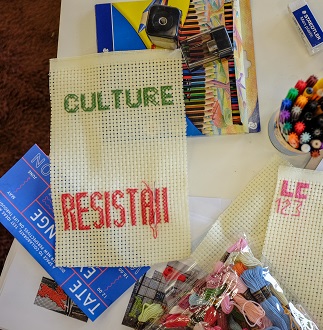Memory & (In) Justice: Cultures of Resistance #Kashmir

Image Credit (all images on page): George Blower
Dr Goldie Osuri in the Department of Sociology collaborated with Uzma Falak, a poet, essayist and filmmaker, to produce a series of events that explored how art, memory and justice are interwoven in the quest for freedom in Kashmir.
Kashmir is one of the world’s most militarised zones. Nearly half a million of India’s troops occupy Kashmir which has a population of 12 million residents. Since the late 1980s, according to the Jammu and Kashmir Coalition of Civil Society, over 70,000 have been killed, over 8,000 have been enforced disappeared, and systematic detention, torture, rape, and extra-judicial killings continue. In learning about Kashmiri cultures of resistance, it became clear that memory plays a central role as a technique of freedom and justice.

Mnemosyne’s Karkhane
MNEMOSYNE: proper noun – the Greek goddess of memory
KARKHANE: noun in Koshur, Kashmir’s native language, refers to an artisan’s workroom.
Visitors to Warwick Tate Exchange were invited to engage with a multi-sensory display featuring poetry, embroidery, a short film and a Twitter newsfeed displaying search results for #kashmir. They also had the opportunity to talk to, sit with, and watch the artist embroider threads symbolic of memory and freedom, and to spend time creating their own embroideries inspired by what they had seen.
‘Unleashing a Thousand Nightingales’: Cultures of Resistance in Kashmir
This event explored the role of creativity, testimony and memory in fostering cultures of resistance. Novelist and journalist Mirza Waheed read extracts from his novels The Collaborator (2011) and The Book of Gold Leaves (2016) - shortlisted for the DSC Prize for South Asian Literature. Artist, poet & scholar, Uzma Falak read a selection of her poems. The readings were followed by a discussion led by Goldie Osuri.
Film as Witness
Film as Witness screened excerpts from Uzma Falak’s film about Kashmiri women's narratives of resistance, Till then the Roads Carry Her (which has been screened at the Open Frame Film Festival and Forum (2015) and the 12th IAWRT Asian Women's Film Festival (2015)). The seminar discussion that followed explored how film as a medium can be a conduit of memory.
